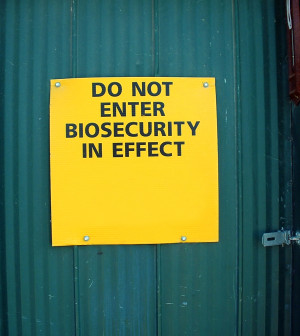- Double Mastectomy May Offer No Survival Benefit to Women With Breast Cancer
- Toxic Lead Found in Cinnamon Product, FDA Says
- Certain Abbott Blood Sugar Monitors May Give Incorrect Readings
- Athletes Can Expect High Ozone, Pollen Counts for Paris Olympics
- Fake Oxycontin Pills Widespread and Potentially Deadly: Report
- Shingles Vaccine Could Lower Dementia Risk
- Your Odds for Accidental Gun Death Rise Greatly in Certain States
- Kids From Poorer Families Less Likely to Survive Cancer
- Tough Workouts Won’t Trigger Cardiac Arrest in Folks With Long QT Syndrome
- At-Home Colon Cancer Test Can Save Lives
Scientists Uncover Breast Milk’s Potential Secret Weapon Against HIV


MONDAY, Oct. 21Experts have long suspected that breast milk may have the power to prevent babies from getting infected with HIV, and new research gives insight into why that might be so.
Researchers say they’ve discovered a component of breast milk that appears to kill the virus that causes AIDS, potentially preventing some babies from becoming infected by their mothers.
“Even though we have anti-retroviral drugs that can work to prevent mother-to-child transmission, not every pregnant woman is being tested for HIV, and less than 60 percent are receiving the prevention drugs — particularly in countries with few resources,” study senior author Dr. Sallie Permar, an assistant professor of pediatrics at Duke University, said in a university statement. “There is still a need for alternative strategies to prevent mother-to-child transmission, which is why this work is important.”
According to UNICEF, an estimated 330,000 children worldwide in 2011 became infected by their mothers during pregnancy or birth.
The protein the researchers pinpointed, known as Tenascin-C or TNC, wasn’t previously suspected to have germ-fighting abilities. The researchers reached their conclusions after testing samples of breast milk from uninfected women to see if it could combat HIV strains.
“TNC is a component of the ‘extracellular matrix’ that is integral to how tissues hold themselves together,” Permar said. “This is a protein involved during wound healing, playing a role in tissue repair. It is also known to be important in fetal development, but its reason for being a component of breast milk or its antiviral properties had never been described.”
Future research should examine whether the protein works with other components of breast milk to fight HIV, she said.
Dr. Barton Haynes, director of the Duke Human Vaccine Institute, added: “The discovery of the HIV-inhibiting effect of this common protein in breast milk provides a potential explanation for why nursing infants born to HIV-infected mothers do not become infected more often than they do.”
“It also provides support for inducing inhibitory factors in breast milk that might be even more protective, such as antibodies, that would completely protect babies from HIV infection in this setting,” Haynes said.
The study was published Oct. 17 in the journal Proceedings of the National Academy of Sciences.
More information
Find out more about HIV/AIDS at the U.S. National Institute of Allergy and Infectious Diseases.
Source: HealthDay
Copyright © 2024 HealthDay. All rights reserved.










